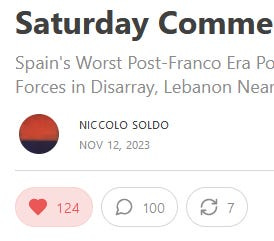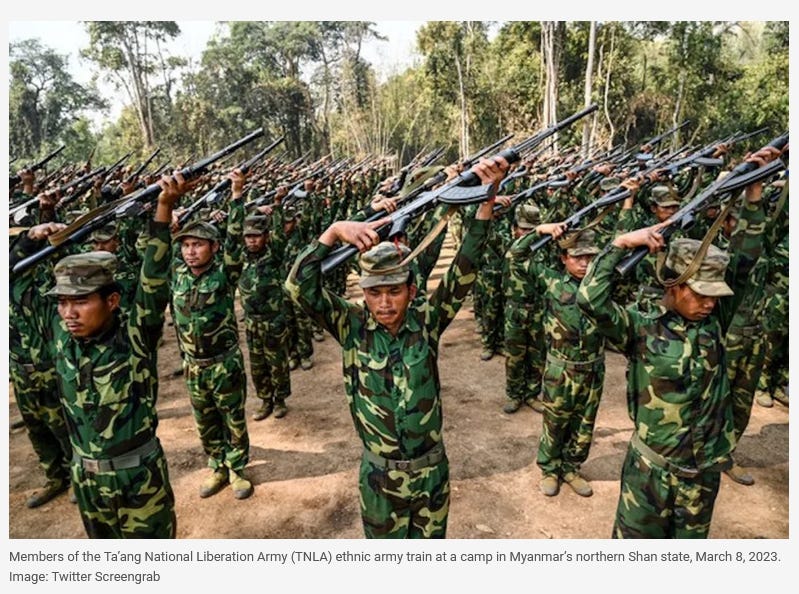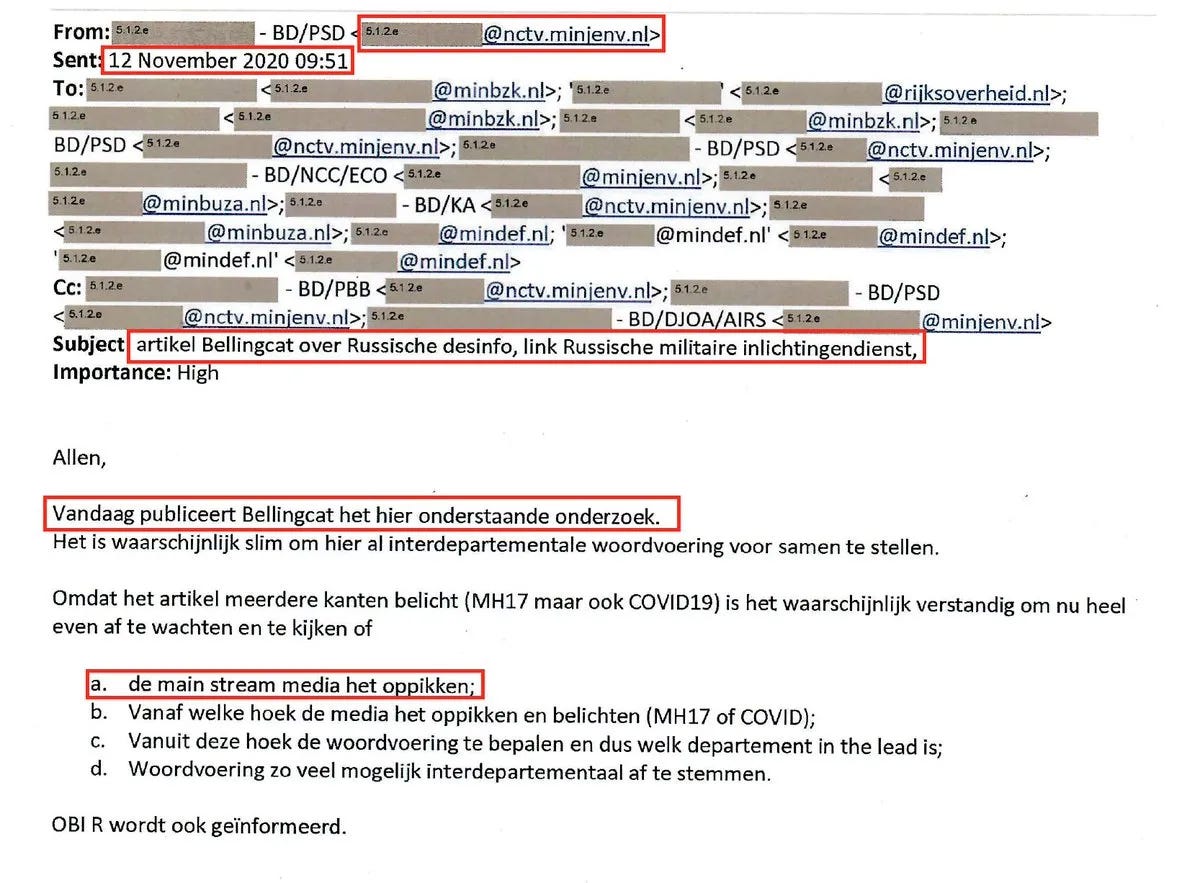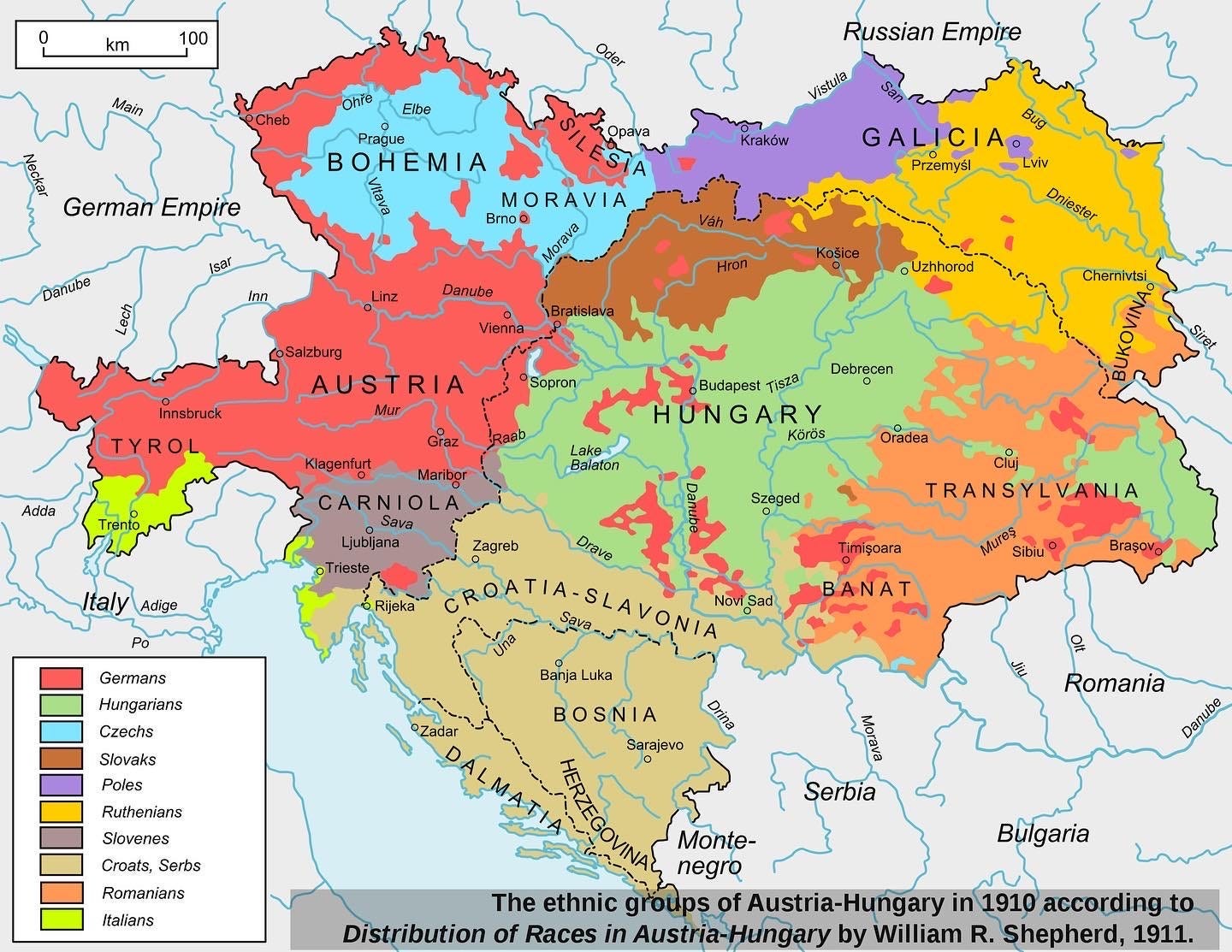Saturday Commentary and Review #149
Saudi Royals Prefer Israel to Hamas, Myanmar Fracturing?, Reichsbürgers: 'Citizens of the Reich', Bellingcat Collaborates With Western Intel?, "There Once Was an Empire"
Every weekend (almost) I share five articles/essays/reports with you. I select these over the course of the week because they are either insightful, informative, interesting, important, or a combination of the above.
Request: Please hit the like button at the top of the page. The more likes these entries get, the more attractive it is to new readers. This place continues to grow, and I would like to maintain the momentum. Just click the button at the top like this:
As it stands right now, the USA has managed to successfully, albeit not perfectly, contain the conflict in Gaza. Not perfectly, because the Houthis are taking potshots at naval vessels in the Red Sea, and US forces located in remote areas in Syria and in Iraq have come under frequent fire from Islamist groupings, even if these attacks have yet to kill a single US serviceman or woman. Hezbollah is doing the bare minimum on Israel’s northern border in order to maintain its anti-Israel bona fides.
Surveying the pro-Palestinian and pro-Hamas opinions on social media, many are spiraling down into “doomerism”, while a minority are holding hope that Hamas is simply waiting out the IDF in its tunnels under the Gaza Strip, confident that the Americas are going to force the Israelis to end their campaign soon enough. Is Hamas pursuing this strategy? I am not in a position to know. What I am certain of is that they did anticipate much more support from their erstwhile allies across the region, something that has failed to materialize.
Arab Street is solidly behind the Palestinians, something that should be expected. However, Arab Street and the rulers of Arab states in the Middle East and the Maghreb don’t always see eye-to-eye. Many Arab rulers are very, very wary of Hamas, and worry that a Hamas victory (whether PR, tactical, or outright) would increase support for them, and by extension, for the Muslim Brotherhood. After all, Hamas’ original charter stated that they were simply the MB branch office for Palestine.
The Saudi royals have long been wary of the Muslim Brotherhood, and for good reason: Islamism has long been a threat to their rule in the “Land of the Two Holy Mosques” (Mecca and Medina), and its more radical flavours have in the past tried to overthrow them. The Saudis dealt with this persistent problem by exporting Jihad abroad, in partnership with the USA, and to a smaller degree, the UK, and by putting many of them on the payroll at home to work as religious police.
The Saudis have for years now been moving closer to Israel in order to create a coalition against Iran, the country who most rivals them for leadership in the Islamic world. Hamas’ raid on Israel has put a spanner in the works, but a successful containment and extinguishing of this new flare up of violence between Palestinians and Israelis would open the door to a completion of this long-awaited deal. David Rundell, ex-Chief of Mission at the US Embassy in Saudi Arabia, explains why the Saudis want this deal and why it makes sense for them to pursue it, despite pressure from Arab Street:
Today, the relationship between Saudi Arabia and the Jewish people has once again come under scrutiny. A historic peace deal between Saudi and Israel has been put on hold since the outbreak of war in Gaza. And the week before last, Saudi Crown Prince Mohammed bin Salman (MBS) called for an “immediate halt to Israeli military operations in Gaza”.
Yet Saudi leaders have always been pragmatists. Two years after the meeting on the USS Quincy, King Abdulaziz’s son, the future King Faisal, led the Saudi delegation to the United Nations, where he tried to prevent the partition of Palestine. He failed, and the United States successfully mobilised support for partition. But although King Abdulaziz was angry and disappointed by Washington’s recognition of Israel, he never threatened the American air base or oil concessions in Saudi Arabia. He placed too great a value on promoting regional stability and maintaining strong relations with the US to risk a diplomatic confrontation.
For most of the last 75 years, Saudi Arabia has tried to stay out of Arab-Israeli wars and promote reconciliation. In 1948, the Saudis contributed two companies of infantry, which fought under Egyptian command. In the Six-Day War of 1967, a Saudi brigade moved slowly towards Jordan, arriving only when a ceasefire was about to be declared. And during the 1973 Arab-Israel War, Saudi Arabia sent one brigade to join the Arab Foreign Legion with strict instructions not to become involved in the fighting. By the time it reached Damascus, the hostilities were over.
Israel was never the most important foreign policy issue for the ruling Saudis:
King Abdulaziz (1875-1953) was always more worried about his Hashemite rivals in Jordan and Iraq than about Israel. His son, King Faisal (1906-1975), regarded Gamal Abdel Nasser’s Egypt, not the Jewish state, as the greatest threat to his kingdom. And today, Saudis are far more concerned with threats from Iran and it proxies in Yemen and Iraq than they are with Israel.
After the 1967 Arab-Israeli War, Arab leaders met in Khartoum, where they adopted their reflexive “Three Noes” with regard to Israel. “No recognition, No negotiation and No reconciliation.” With the exception of Egypt, this remained their unanimous, unwavering and unhelpful position for the next 15 years. Only in 1981 did the then Saudi Crown Prince Fahd (1921-2005) put forth a fresh proposal by which “all states in the region should be able to live in peace”. Fahd’s plan did not explicitly recognise Israel, but it implied that this was possible after the creation of a Palestinian state and a return to Israel’s 1967 borders.
Much like Hezbollah at present is doing the bare minimum to save face in front of the Arab and Islamic world, the Saudis have for decades done the same on the diplomatic front. The ugly fact of the matter for Palestinians and those who support them is that their conflict with Israel is viewed by the Saudis (and many others in that part of the world) as a nuisance, irritant, and impediment to their larger interests, especially economic.
Recent history:
In 2020, the Trump Administration orchestrated the Abraham Accords, through which the United Arab Emirates, Bahrain, Sudan and Morocco all normalised relations with Israel. Riyadh implicitly supported the deal by allowing Saudi journalists to write op-eds praising it. It is unlikely it would have materialised had the Saudis strongly objected and Riyadh implicitly supported the settlement by allowing Saudi journalists to praise it.
In recent years, the benefits for Saudi of making peace with Israel have significantly increased, while the costs have appeared to decline. The latter were largely political: older Saudis who grew up with Nasser’s Arab Nationalism continue to regard unwavering support for Palestine as an essential part of their Arab identity. As the guardians of Mecca, the Saudis cannot ignore widespread sympathy for Palestine in the Muslim world. Nor can they remain indifferent to the status of the Muslim holy sites in Jerusalem.
The case for peace with Israel:
Yet peace with Israel would be a massive boost to Saudi Arabia’s national security. It would improve Saudi Arabia’s relations with its most important security partner, the United States — and reduce opposition to those relations among the Saudi public. What’s more, peace would strengthen Saudi Arabia’s hand against Iran, which since the 1979 Iranian Revolution has challenged Saudi leadership in the Muslim World and sought to extend its influence in Lebanon, Iraq, Syria and Yemen. Despite the recent Saudi-Iranian rapprochement, Saudi and Israeli leaders still share many reasons to resist Iran’s pursuit of regional hegemony and nuclear weapons.
If this does read like it’s written by an individual who is close to Saudis, that’s because it clearly is. Despite this favouritism, what he is outlining here does make sense.
But then we read this:
Saudi Arabia and Israel have another goal in common: suppressing radical Islamist groups such as al-Qaeda, Isis, and the Muslim Brotherhood. Like the Shi’a revolutionary government in Tehran, many radical Sunni Islamist groups seek to destroy both Israel and the Arab monarchies. Having suffered from numerous al-Qaeda attacks themselves, the Saudis understand the threat of jihadist militants. They have a long-strained relationship with Iranian-backed Hamas, as well as its junior partner, the Palestinian Islamic Jihad. Saudi authorities have arrested or deported Hamas supporters in Saudi Arabia and would quietly welcome the organisation’s demise. This gives Saudi Arabia and Israel further grounds for cooperation.
The fact of the matter is that groups like al-Qaida and ISIS would not have come out if it were not for the control of the most important global Islamic charities by the Saudis, and how their financing of jihadism OUTSIDE of Saudi Arabia has been done in coordination with the USA ever since Zbigniew Brzezinski flew out to meet the Mujahideen in Afghanistan in 1979. Furthermore, the Israelis sided with and supported al-Qaida in the Syrian Civil War. Rundell has a point about the Muslim Brotherhood, though.
Why the Saudis need Israel:
The two nations also have economic interests in common. MBS has staked his political future on the success of Vision 2030, an ambitious development programme that aims to diversify his economy away from oil. But his reforms won’t succeed if the Middle East is consumed by a major war, and therefore it is in his interests to promote lasting peace with Israel.
Furthermore, to succeed, Vision 2030 will require foreign direct investment, technology transfer, increased non-oil trade, and even more tourists — all of which Israel has in abundance. Another goal of Vision 2030 is the creation of a local defence industry. Saudi Arabia has a defence budget larger than Britain or Germany, but today nearly all its weapons and military equipment are imported. The new General Authority for Military Industries wants to change that — and Israel, with its sophisticated defence industry, is well-placed to help.
The Saudis and Israelis both view Iran as enemy number one, despite the Chinese-orchestrated summit between Riyadh and Tehran that took place not too long ago. Ending this conflict in Gaza can put the Saudis and Israelis back on the path towards a grand deal….something that the Iranians definitely do not want to see happen at all.
Myanmar (previously known as ‘Burma’) is a dark spot on the map for almost everyone in the West. Very little news filters out of there, and when it does, it is always about the decades’ old civil war, or about the military junta that rules the country. Myanmar doesn’t do western liberal democracy, and rarely does any form of democracy whatsoever.
The only Burmese person that most anyone can name is Aung San Suu Kyi, a politician and diplomat who won the Nobel Peace Prize in 1991, and helped transition the country from rule by a military junta to a “partial democracy” during the early 2010s. Feted by the West for over two decades, she went off script when she became the country’s sorta Prime Minister1 and defended Myanmar from charges of “genocide of the Rohingya people”. Not to worry, as the Burmese military (Tatmadaw) launched a successful coup d’etat in 2021, put her on trial, and sentenced her to 33 years in prison (reduced to 27 years recently) for corruption.
To understand why Myanmar is such a mess, take a look at this ethnic map:
Suffice it to say that it’s a mess. To make matters worse, Myanmar sits between India and China, and shares a very long border with US client Thailand. Geo-strategic interests abound, and so do ethnic and confessional ones too. The military is the glue that continues to hold the state together, but hasn’t had complete control over its entire territory in a long, long time due to the many rebel forces that it has been fighting for decades now, and who also enjoy fighting each other.
Myanmar is forcing its way back into the news, as an alliance of three rebel groups in the country’s east launched a very successful offensive recently, forcing the country’s military to retreat from several locations along its border with China. I’m relying on John P. Ruehl to give us some background on this opaque conflict:
Myanmar’s stability has eroded significantly since the 2021 military coup. But the coordinated attack by multiple separatist and pro-democracy groups in October and November 2023 has seen military outposts, villages, border crossings, and other infrastructure overrun. While the Tatmadaw, Myanmar’s military, clings to control in central and coastal regions populated by the country’s ethnic majority, much of the country’s border areas are increasingly slipping into anti-government control.
Some historical background:
This current turbulence is not an aberration but deeply rooted in Myanmar’s history. Since gaining independence from British rule in 1948, the country has grappled with what is commonly described as the world’s longest-running civil war. Initial experiments with democracy witnessed limited clashes between Myanmar’s central government and Ethnic Armed Organizations (EAOs.) Following a military coup in 1962 that established the junta, more EAOs emerged to challenge government power.
Infighting and splintering among EAOs, coupled with their growing antagonism toward the Burma Communist Party (BCP), itself waging a war on the central government, allowed the junta to implement fragile ceasefires in exchange for limited autonomy. By the end of the Cold War, democratic protests in 1988, the collapse of the BCP in 1989, and free elections in 1990 all suggested Myanmar was cautiously embracing a peaceful future.
Despite losing the elections in 1990, however, the junta did not relinquish power, drawing international condemnation. EAOs and other groups like the Myanmar National Democratic Alliance Army (MNDAA), which split from the BCP, then continued their struggle for two decades until the junta ceded some powers to a civilian administration in 2011. Elections in 2015 and 2020 saw landslide victories for the National League for Democracy (NLD), as well as some progress toward reconciliation.
But in 2021, the Tatmadaw reestablished the junta and plunged the country back into destabilization, culminating in the 2023 autumn offensive by anti-junta forces. In addition to EOAs and a reorganized BCP, the junta has also been forced to contend with People’s Defense Forces (PDFs), loose armed organizations backed by the National Unity Government (NUG), set up by lawmakers and politicians in the aftermath of the coup. Additionally, the role of the Burman ethnic majority and grassroots civil defense forces in opposing the junta has also complicated its response to unrest.
This is a very, very complex conflict, to say the least.
China’s role:
China’s role in Myanmar has undergone significant shifts since the latter’s independence. Despite Chinese support for the BCP and other communist groups, Myanmar grew closer to China after its isolation from the West in the 1990s. Beijing supported the junta to stabilize Myanmar and prevent adversaries from establishing a foothold on China’s southern border. Other interests included maintaining access to Myanmar’s raw materials and natural resources, as well as infrastructure development to turn Myanmar into a strategic gateway to the Bay of Bengal through the China-Myanmar Economic Corridor (CMEC), part of China’s Belt and Road Initiative (BRI).
China maintained ties to the junta, democracy advocates, and ethnic groups from 2011 to 2021. However, the 2021 coup disrupted development projects and led to attacks on Chinese-run facilities by rebel groups, and the junta’s inability to protect infrastructure exacerbated historical tension between it and Beijing. Four Chinese civilians were killed in 2015 after a Myanmar military airstrike hit across the border into Yunnan, while the junta burned down a Chinese-owned factory and killed Chinese and Myanmar civilians in 2021.
China’s ongoing support to some militia groups, such as the United Wa State Army (UWSA) and MNDAA, provides Beijing leverage over the junta and a say in the ceasefire processes. Chinese firms also often work with armed groups in “special economic zones” near the border, and some of the anti-junta groups regularly cross the border to China to escape the junta and its proxy forces. Beijing’s tacit approval of their activities may also be partially fueled by wariness that rebel groups were becoming closer to the U.S. prior to the new offensive.
Beijing has nonetheless attempted to sustain a balancing act, arresting a UWSA deputy military chief in October 2023 and initially ignoring calls for assistance from the rebels after the launch of their offensive. But following the steady string of defeats suffered by the junta, China has since altered its outlook. China’s affiliates now form some of the most powerful groups operating in Myanmar, and China’s foreign ministry has called for a ceasefire.
Not only does China have to keep a tight leash on Hong Kong and Xinjiang, a close eye on Taiwan, Japan, Vietnam, but it also has to contend with a destabilized Myanmar. All of this on top of the USA trying to contain them in East Asia.
American anti-communist efforts:
American efforts to counter communism inadvertently helped develop drug networks in Myanmar during the early Cold War, while transnational organized crime in Southeast Asia burgeoned in the 21st Century. The COVID-19 pandemic further established Myanmar as a hub of criminal activity, expanding the funding networks available to the country’s armed groups. Both local and international criminal networks operate in Myanmar’s special economic zones, engaging in human and wildlife trafficking, slavery, cybercrimes, money laundering, communication fraud, illegal casinos, and online gambling centers.
The relationships between these entities and governments are intricate, with shifting alliances commonplace. Beijing and transnational Chinese gangs play central roles in Myanmar’s heightened criminal activity. The junta has also had close ties to criminal networks for decades, and since the 2021 coup has become increasingly reliant on criminal activity to finance itself and offset international isolation.
Rebel groups using new military tech against the government’s forces:
Additionally, while the junta styles its current campaign as a counterinsurgency, Myanmar’s armed groups possess significant military capabilities. Minority groups such as those belonging to the Karen ethnic group were prominent in Myanmar’s armed forces during the British colonial administration, gaining valuable experience. As in Ethiopia, certain ethnic groups have developed and maintained well-equipped forces capable of both insurgency and conventional warfare.
Like other anti-government forces around the world, Myanmar rebel groups have also embraced new technologies and strategies in recent years. This includes crowdfunding initiatives, which have expanded significantly since 2021, to offset the junta’s control over the central bank and other national economic levers. Large-scale application of drone warfare has also made a marked difference on the battlefield, even before the current offensive by the rebels.
Myanmar’s militant groups have also worked with European criminal groups to obtain weapons, and groups like the UWSA have proven capable of manufacturing weapons since 2008. The use of 3D-printed guns by Myanmar rebel groups, just ten years after the first 3D-printed gun was produced, also marks a distinctive feature of the current conflict. The NUG has meanwhile been busily setting up local civic administration and public services and People’s Administrative Teams (PATs) in PDF-controlled or contested areas, indicative of their state-building capabilities.
The author concludes that an America distracted with too many conflicts on its plate to manage allows the Chinese a free hand to manipulate outcomes in Myanmar, but chooses to do so from a distance, avoiding direct intervention.
Exactly one year ago this past Thursday, German police launched their largest raid in history (3,000 officers were involved). They targeted the ‘Reichsbürger Movement’, on the grounds that ‘extremists’ within it were plotting to overthrow the government, storm parliament, arrest lawmakers, and declare the restoration of the Monarchy with aristocrat Heinrich XIII Reuss to head it. (Click here to see our coverage of this story).
An attempt to do any one of these things would be huge global news…but this story disappeared immediately. Why? Because it was bullshit, of course.
The mainstream media counts on all of us having short attention spans, and generally they are right. This allows them to cycle stories, hoping something eventually sticks. In this report from AFP, we are re-introduced to the Reichsbürgers, and are informed once again about how big of a danger they pose to the German state:
On the outskirts of the eastern German town of Wittenberg, a corrugated iron gate painted with green leaves welcomes visitors to the "Koenigreich Deutschland" (Kingdom of Germany).
Those who step through the gate to the cluster of buildings on the other side are entering place that styles itself a country, complete with its own flag, laws, currency and ID cards.
The so-called Kingdom of Germany was founded by former chef and karate teacher Peter Fitzek, who anointed himself as "king" in 2012 in an elaborate ceremony complete with a crown and sceptre.
Fitzek and his followers are part of a movement known as the Reichsbuerger (Citizens of the Reich), a loose grouping of in some cases violent extremists and conspiracy theorists who reject the legitimacy of the modern German republic.
German officials really, really need more extremists to be manufactured in order to be able to ban AfD, as it is becoming too popular with the voting public. So far, it hasn’t been able to make the case for extremism within the party’s ranks, but if they can tie them into this movement, it might just do the trick.
The “movement”:
His territory has since grown to encompass several different sites across Germany and has more than 5,000 self-proclaimed citizens.
They tend to be people with a "pioneering spirit" who "want to make a positive change in this world", Fitzek told AFP in Wittenberg, the group's original base.
"We are open to all people who have their heart in the right place," he said, sitting on a salmon-coloured sofa in the corner of a drab open-plan office.
The Wittenberg complex comprises several office buildings, a carpentry workshop, a gift shop selling items made on site and a canteen that serves only vegan food.
About 30 people live and work on the site in a commune-style arrangement.
They are all non-smokers, non-drinkers and not vaccinated against Covid-19 -- the kingdom has its own health insurance system for which this is a prerequisite.
As Fitzek strode around the Wittenberg site, pointing out everything from eco-friendly heating systems to a coin press machine for making "new German marks", he promoted his project glowingly.
But in the latest raid, investigators said Wednesday they targeted 10 sites belonging to the "kingdom" on suspicion that it was running "banking and insurance businesses without the necessary permits".
From overthrowing the government to permit violations in one year. Neat.
Now check this out:
There were around 23,000 members of the Reichsbuerger movement in 2022, according to Germany's federal domestic intelligence agency -- up from 21,000 in 2021.
The number considered potentially violent also rose from 2,100 to 2,300.
While Reichsbuerger members subscribe to a similar ideology, the movement is made up of many disparate groups.
In November, German officials raided apartments nationwide over an alleged plot by a group of Reichsbuerger to spread conspiracy theories and "destabilise" the state through social media.
Raided for shitposting.
The kicker:
Some have already resorted to violence and with the movement growing, "there is always a danger that... more will feel called upon to take action against the state order," Hollmann told AFP.
Many ordinary Germans are also concerned about the rise of the movement.
In the village of Halsbreucke, near Dresden, local residents have formed an association to oppose plans by Fitzek's "kingdom" to build an organic farm, in the hope of getting authorities to impose a right to refuse.
"It all sounds quite harmless at first," said Jana Pinka, 60, an engineer and local councillor. But it is the "context" of the plans that troubles her.
"We see both this rejection of the state, including Germany's borders, and the fact that people are seeking proximity to right-wing populist groups. That scares us a little," she said.
"Everything within the state, nothing outside the state, nothing against the state" - Benito Mussolini
“Open Source Intel” has been all the rage on social media for years now. Positioned as ‘regular people using technology to monitor and track conflicts’, the desired imagery that is supposed to be generated in your head is that of computer nerds sitting at home, uncovering information that is either secret or not yet uncovered by anyone, relating to an ongoing conflict. It resembles the notion that NGOs are just grassroots operations that represent “the will of the people”.
Few people are this naive these days, as it’s little secret that the most powerful NGOs are simply funded by corporations and governments to serve as end runs around democracy, while claiming to protect it or to fight for it. Open Source Intel is not much different, it seems. Kit Klarenberg has been keeping a very close eye on Bellingcat, one of the best known Open Source Intel outfits, and makes the argument that is has long colluded and collaborated with western intel:
An extraordinary email uncovered by a Dutch researcher under freedom of information laws confirms what many have long charged: Bellingcat, the “open source” collective widely cited by mainstream journalists and loved by the CIA, collaborates directly with Western intelligence agencies.
An email sent on November 12 2020 by an officer within Amsterdam’s National Coordinator for Security and Counterterrorism (NCTV) shows a Bellingcat investigation was intentionally shared with the agency prior to publication, so as to assist the Dutch spooks in shaping media strategies and messaging following its release. The revealing communication is irrefutable proof of the cozy relationship the self-styled “independent investigative collective of researchers, investigators and citizen journalists” enjoys with Western intelligence services.
In the message, marked “high importance,” the undisclosed author explained that Bellingcat would soon publish research amounting to a deeply libelous attack on independent journalists and researchers, who challenged the mainstream narrative surrounding Malaysia Airlines Flight 17. As such, the Dutch intelligence officer wrote, “it is probably smart to put together interdepartmental wording for this already”:
“Because the article highlights several sides (MH17 but also COVID19) it is probably wise to wait a while and see if; a. the mainstream media pick it up; b. from which angle the media pick up and highlight it (MH17 or COVID); c. from this angle to determine the wording and therefore which department is in the lead; d. coordinate the language as much as possible interdepartmentally.”
more:
Bellingcat, which serendipitously launched just days before the downing of MH17, came to prominence by immediately seizing on this deluge of carefully-curated and potentially falsified information. With amazing speed, the organization claimed to have precisely mapped out what happened that fateful day, and exactly how it occurred. Despite its relative inexperience and opaque organizational structure, its findings were accepted without a shred of scrutiny by Western journalists, lawmakers, pundits, and the official Dutch MH17 tribunal, which concluded in November 2022.
Bonanza Media’s film, “MH17 – Call for Justice”, features interviews with witnesses on-the-ground that day and Malaysian government officials who did not accept the official story, but doesn’t rule out the possibility of Russian culpability altogether. However, the documentary presented a substantial challenge to Bellingcat’s version of events – which also happened to align neatly with the official narrative. In 2020, Bonanza also published leaked documents confidentially submitted to the tribunal. This included Dutch intelligence files recording that while many Ukrainian Buk systems had been spotted in eastern Ukraine, Russian equivalents were nowhere to be seen.
Evidently, Bellingcat and its founder, Eliot Higgins, were displeased with their results. As Dutch freelance journalist Eric van de Beek wrote in 2020, “because it was impossible for Bellingcat to discredit Van der Werff on the basis of the well-researched content featured on his blog and in his recent documentary, Eliot Higgins opted to wage a campaign of misinformation.”
A lot of this is inside baseball, but it’s worth checking out.
Click here to read the rest.
We end this weekend’s SCR with a long essay about how writers wrote about the collapse and end of the Austro-Hungarian Empire that they lived in shortly after it happened:
One such ghost, often forgotten but lasting an exceptionally long time when it was real, is Austria-Hungary. Both Austria and Hungary were ruled by the Habsburg dynasty for what certainly felt like forever, centuries upon centuries, finally merging as a dual monarchy in 1867.7 Its emperor, Franz Joseph, reigned from 1848 to 1916, which only added to the perception of its eternal stability. But in the last year of World War I, the country collapsed and a generation of writers reflected on what they once took for granted permanently being no more.
Because its capital Vienna was a cosmopolitan city long famous for its literary tradition and art, the language to describe this loss came naturally. The result was a corpus of writing unlike any other, uniquely about the experience of coping with a world lost. As historian Eric Hobsbawm observed:
Of all the great multi-lingual and multi-territorial empires that collapsed in the course of the 20th century, the decline and fall of the Emperor Franz Joseph’s, being both long expected and observed by sophisticated minds, has left us by far the most powerful literary or narrative chronicle.
Austrian minds had time to reflect on the death and disintegration of their empire, while it struck all the other empires suddenly, at least by the measure of the historical clock, even those in visibly declining health like the Soviet Union. But perhaps the perceived and accepted multi-linguality, multi-confessionality and multiculturalism of the monarchy helped them to a more complex sense of historical perspective.8
This much is evident in the literature. While their German neighbors opted for more programmatic political solutions, Austrian writers settled into a more ironic style, sometimes even tinged with humor and a penchant for absurdity, alongside a cynical attitude toward the state’s ability to reform human life.9 When read today, such sentiments seem oddly contemporary as if speaking to our current detached sensibilities.
Still, their disposition should not be misinterpreted as being excessively pessimistic or even fatalistic. On the contrary, Austrian writers during this time produced works that stressed realism, almost like a documentarian would, but with an appreciation for drama. In their world, the writer's purpose was to provide a "probing analysis of the fundamental desire and principles” that constituted society.10 And so they came from all corners of the multicultural empire that was Austria-Hungary, intending to present and show life “how it really was.”11
This is a great essay. Click here to read the rest.
Thank you once again for checking out my Substack. Hit the like button and use the share button to share this across social media. Leave a comment below if the mood strikes you. And don’t forget to subscribe if you haven’t done so already.
And don’t forget to join me on Substack Notes!
She was made ‘State Counsellor’, a role akin to Prime Minister and Head of State that was created especially for her, as she could not become President due to her late husband and children being foreign citizens, violating the Constitutional clause for who could hold that role














Click the like button at the top of the page to like this entry. Use the share and/or re-stack buttons to share this across social media. Leave a comment if the mood strikes you to do so.
I will now turn to finishing off the long entry on the War in Ukraine that I promised you earlier this week.
1. Any pretext will do for Germany to ban the AfD. The real reason cannot be stated, and that is opposition to American hegemony in general and thr war on Russia in particular.
2. The Dutch merely additionally confirmed what everyone already knew.